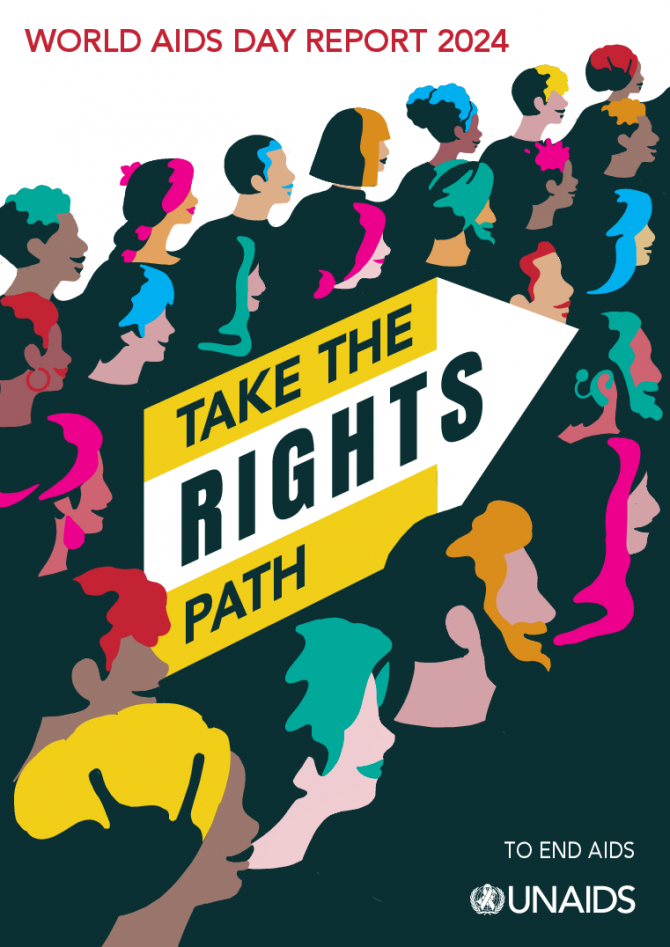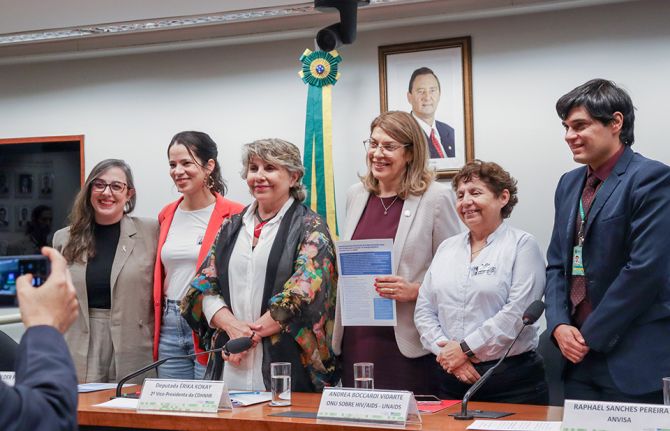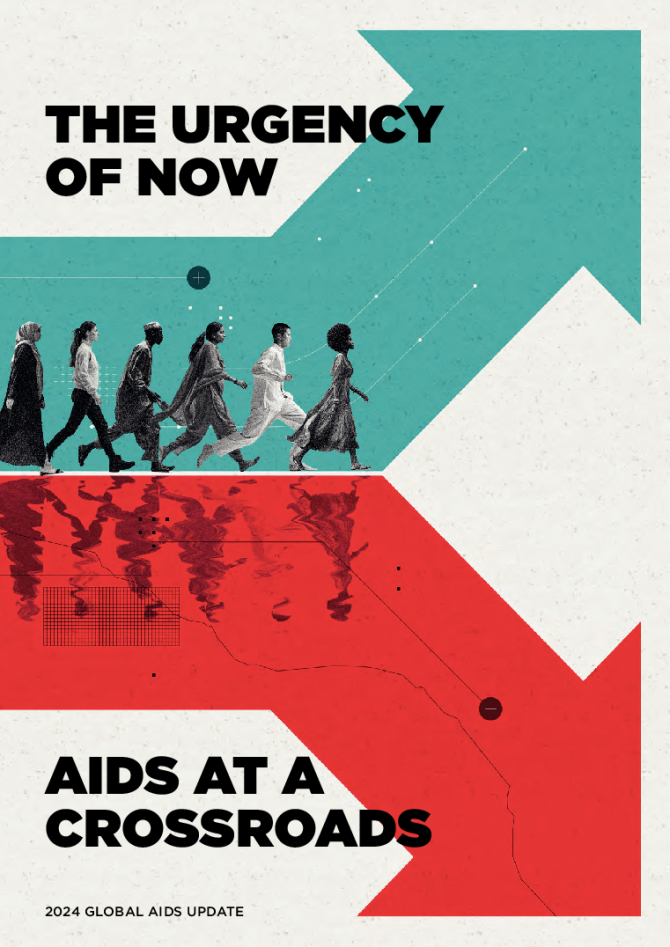Documents
Take the rights path to end AIDS — World AIDS Day report 2024
26 November 2024
The world’s decades-long response to HIV is at an inflection point. Despite successes, the world is currently not on track to end AIDS as a public health threat by 2030. Press release | Download full report | Download short version

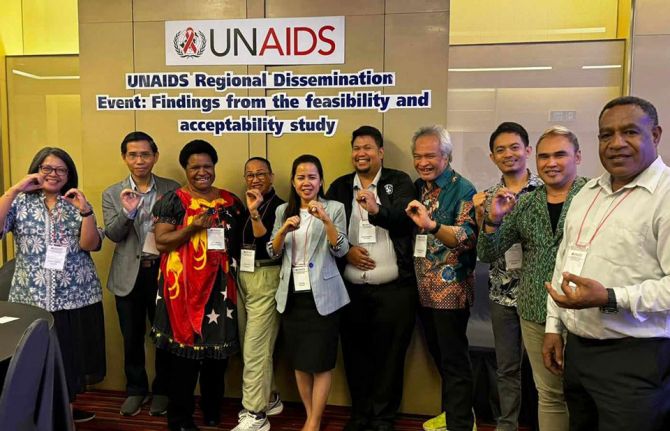
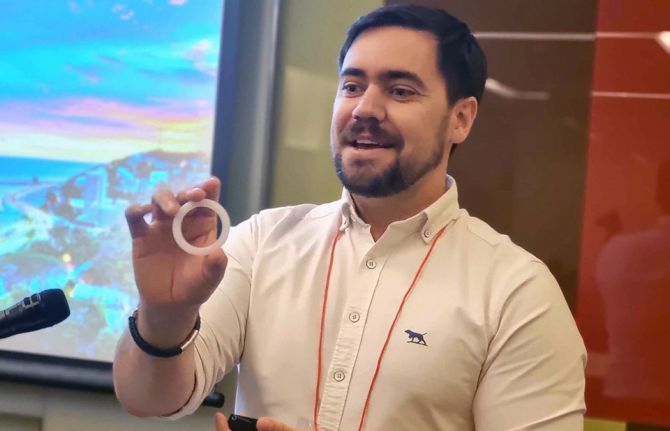
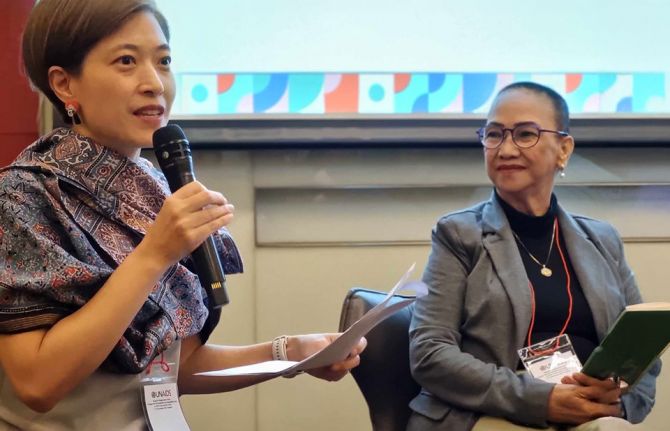
Feature Story
PrEP for her: Cambodia, Indonesia, Papua New Guinea and the Philippines prepare to introduce the Dapivirine ring to help prevent HIV
22 November 2024
22 November 2024 22 November 2024The only HIV prevention that Elena Felix knew of was condoms. But condoms were not something that she was able to make use of, and she contracted HIV. Thirty years after her diagnosis, she’s helped conduct research to determine whether women in the Philippines would use a more confidential tool, and one that does not need a man to agree, to lower women’s risk of HIV infection.
“We hear from women that some partners insist on not using condoms. We hear cases too of rape. Women need protection that does not depend on men” the Association of Positive Women Advocates founder explained.
The Dapivirine Vaginal Ring or DVR was given the green light by the World Health Organization for women at high risk of contracting HIV in 2021. Unlike other types of pre-exposure prophylaxis (PrEP), this one is exclusively for women. It is a silicone vaginal ring that is inserted and worn for 28 days before being replaced. It releases an antiretroviral drug locally, reducing the risk of HIV infection through vaginal sex by half.
Since its introduction, the technology was made available in several (11) African countries. And with good reason. Around two-thirds of new HIV infections in Eastern and southern Africa and Western and central Africa are among adolescent girls and women. The combination prevention strategies implemented in these two regions have super-charged progress, driving the global 39% decline in new infections since 2010.
But the Asia Pacific picture is quite different.
“This region has an HIV prevention crisis,” Eamonn Murphy, UNAIDS Regional Director for Asia Pacific and Eastern Europe Central Asia said. “And I am not speaking only of the countries where new infections have doubled, tripled or increased six times since 2010. The average regional decline in new infections is far too slow. At 13% it has virtually flatlined.”
He was speaking to a group of community, government, research and development partners from Cambodia, Indonesia, Papua New Guinea and the Philippines who met from November 11 – 12 in Bangkok. Findings were disseminated from a DVR acceptability and feasibility study conducted by ThinkPlace, and a discussion held on next steps. UNAIDS and the World Health Organization (WHO) are providing technical support for this initiative. The Australia Department of Foreign Affairs and Trade (DFAT) funded the research as part of its ongoing support for prevention work in the region.
Seven percent of new infections in Asia Pacific are among sex workers while 12 percent occur among the intimate partners of key populations. Angeli Achrekar, UNAIDS Deputy Executive Director, called for women in Asia and the Pacific to be provided more HIV prevention options.
“Choice is the way to go!” Ms Achrekar stressed. “Providing options in prevention tools and service delivery increases overall use and results. We must ensure that people have access and that they are supported with the appropriate policies and enabling environment. The ring has great potential to be empowering as an additional choice for women, including in Asia Pacific.”
A person newly acquires HIV in the Asia Pacific region every two minutes. Despite this, the overall momentum on rolling out pre-exposure prophylaxis (PrEP) options has been sluggish. At the end of 2023 there were just 204,000 PrEP users in this region, 98% short of the 8,200,000 target by 2025. The vast majority of those on PrEP were men.
ThinkPlace Regional Director, Elliot Duffy, revealed that overall, the studies found women have high interest in this discreet, woman-controlled prevention method. Sex workers in the four countries sought the DVR given their high vulnerability to sexual violence. And in all countries the sex workers indicated that they would want to access the DVR through community-based health services or their local healthcare facilities. The research also found that healthcare providers in the four countries were enthusiastic about offering this new prevention option.
“The number one barrier is the extent to which women understand how the ring would fit. Many had questions like, “would it be lost in my body? Will I feel pain? Will I be able to have sex?’ Some women worried about a partner thinking they distrusted them,” Mr Duffy explained. “The DVR is not immune to the challenges of other HIV programs and continued effort is needed to increase awareness, generate demand and create services that are accessible.”
Already the research findings have resulted in the introduction and phased implementation of the DVR into 2024 – 2026 Global Fund grant implementation for Cambodia and Indonesia. Cambodia has begun pilot testing. At the meeting the four country teams developed plans to guide their next steps, including on further research, legal and policy reviews, regulatory approvals and community system strengthening.
DFAT Health Adviser, Joshua Metcalf-Wallach, emphasized that as stakeholders switched gears from research to rollout, they should keep communities in the driver’s seat.
“Our Indo-Pacific prevention work has shown that HIV services work best when they are key population- and community-led. As we expand prevention options for women, let us be guided by their needs and demands,” he ended.
Our work
Region/country


Feature Story
New long-acting HIV prevention options for women and girls in an era of choice
14 October 2024
14 October 2024 14 October 2024New long-acting technologies are changing the HIV prevention landscape. In recent years, innovation in pre-exposure prophylaxis (PrEP) has accelerated. Long acting injectable cabotegravir and the dapivirine vaginal ring as innovative formulations of PrEP have already joined oral PrEP containing tenofovir as WHO-recommended effective and acceptable options for HIV prevention, and there are additional antiretroviral-based options on the immediate horizon. These options complement other effective, non-antiretroviral-based HIV prevention products including condoms and lubricants, and harm reduction strategies.
This year clinical trial results for PURPOSE 1 and 2 showed the high prevention effectiveness of the 6-monthly long-acting injectable drug, lenacapavir for cisgender adolescent girls and women, cisgender men and transgender women. Among the cisgender adolescent girls and women participating in the trial, no HIV acquisitions were recorded during 12 months of follow-up among the women who received injectable lenacapavir. The Global HIV Prevention Coalition (GPC), UNAIDS and other partners called on Gilead Sciences to accelerate their efforts in ensuring that it is made available, accessible and cost effective especially to low- and middle-income countries. This twice-yearly injection is a promising option and offers increased choice, discretion and convenience for people who may benefit from HIV prevention.
In October 2024, at the Research for Prevention (R4P) conference in Peru, the Population Council announced phase 1 trial results from IPM 054, showing that the three-month dapivirine ring is as safe as the currently available one-month ring with similar levels of drug release. The 3-month ring like the 1-month ring is a woman-controlled option but would be more cost effective (an estimated 60% reduction in cost per user) and potentially an even more convenient HIV prevention option for women and adolescent girls.
“We need to follow the science, and the science has shown us that by making a range of effective HIV prevention options available and accessible, we can stop HIV transmission and drop new infections by addressing biomedical, behavioral and structural drivers simultaneously. Ending AIDS remains a political and financial choice”, says Angeli Achrekar, UNAIDS Deputy Executive Director Programmes.
This complements a partnership announcement by the Global Fund and the Children’s Investment Fund Foundation (CIFF) of an USD 2 million initiative for 2024-2025 to purchase an estimated 150 000 dapivirine vaginal rings for use as PrEP in the Global Fund grant implementing countries. This would increase accessibility to one of the most discreet HIV prevention options for women and adolescent girls.
The World Health Organization (WHO) PrEP Implementation Tool Provider Module for Oral and Long Acting PrEP, launched in July 2024, integrates clinical service delivery guidance for the three WHO recommended PrEP products (oral PrEP, the dapivirine vaginal ring and long-acting injectable cabotegravir) by a range of different providers in clinical or community settings and emphasizes the importance of access and choice.
These strategic advancements align to the HIV Prevention Choice Manifesto For Women and Girls in Africa that calls for prevention options to be made choices and urges that research and development of new HIV prevention options actual choices, thereby empowering women and girls to take control of their health and bodies. It also emphasizes the importance of ongoing research and development of innovative HIV prevention methods.
“Adolescent girls and women are gaining access to an increasing range of safe and effective options. Scale-up of HIV prevention will depend on supporting access to choice, strong country leadership and an enabling environment. An HIV free future for girls is possible, but only if the global community comes together with ambitious plans to make this range of PrEP options available with speed, scale and equity,” says Mitchell Warren, Executive Director, AVAC and GPC, Co-chair.
The GPC co-convened, by UNAIDS and UNFPA, will continue to work with its partners to accelerate HIV prevention to achieve the global target of less than 370 000 new HIV infections annually by 2025.
About the GPC
In 2017, a global coalition of United Nations Member States, donors, civil society organizations, and implementers was established to support global efforts to accelerate HIV prevention. Membership includes 38 of the highest HIV-burden countries, UNAIDS Cosponsors, donors, civil society, and private sector organizations. The overarching goal of the Global HIV Prevention Coalition is to strengthen and sustain a political commitment to primary prevention by setting a common agenda among key policymakers, funders, and program implementers.

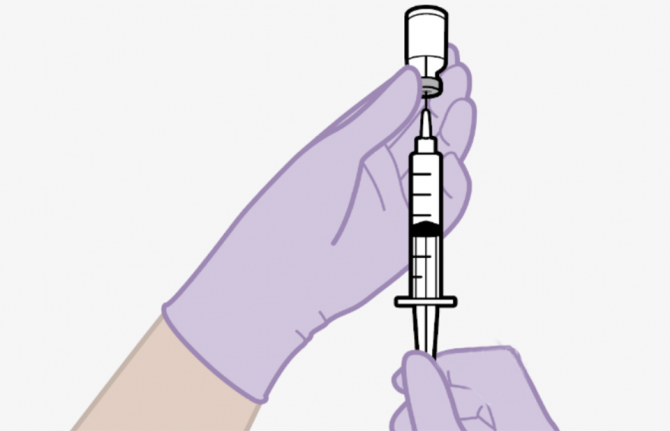
Press Statement
UNAIDS response to ViiV’s announcement on increasing production of long-acting cabotegravir
08 October 2024 08 October 2024GENEVA, 8 October 2024—Responding to ViiV’s announcement on long-acting cabotegravir , UNAIDS Executive Director Winnie Byanyima said:
“New HIV prevention medication, in the form of a long-acting injection, could transform the lives of people who struggle to take daily pills. The option of an injection that only needs to be taken once every few months is vital for people who face stigma when seen with pills, and those who are driven underground by criminalizing laws.
The people most in need of this long-acting option include adolescent girls, LGBTQ+ people, sex workers, and people who use drugs.
The arrival of long-acting injections is truly a game-changer – it can help prevent millions of new HIV infections.
But this will only happen if everyone who would benefit has access. When medicines are lifesaving, delays are fatal.
To ensure affordable pricing and worldwide availability for everyone who needs these medicines, enabling access to generic versions in all low- and middle-income countries is essential. But ViiV continues to lock out many low- and middle-income countries from this possibility. Shockingly, the company has even launched a legal challenge against Colombia for trying to access a generic version of another lifesaving HIV medicine, dolutegravir.
ViiV's announcement on increasing production of long-acting cabotegravir is a welcome first step, but their next steps must follow fast. It is not enough for ViiV to increase the number of doses up for sale.
I urge ViiV to show leadership on access to medicines now by announcing an affordable not-for-profit price, dropping its harmful legal challenge, and enabling all low and middle-income countries to access generic versions of its medicines.
That is how they can help ensure this scientific breakthrough fulfils its potential and how they can help bring an end to the AIDS pandemic."
/ENDS
Note: ViiV’s announcement can be read on their site at https://viivhealthcare.com/hiv-news-and-media/news/press-releases/2024/october/triple-annual-supply-of-long-acting-hiv-prep-for-low-and-middle-income-countries/
UNAIDS
The Joint United Nations Programme on HIV/AIDS (UNAIDS) leads and inspires the world to achieve its shared vision of zero new HIV infections, zero discrimination and zero AIDS-related deaths. UNAIDS unites the efforts of 11 UN organizations—UNHCR, UNICEF, WFP, UNDP, UNFPA, UNODC, UN Women, ILO, UNESCO, WHO and the World Bank—and works closely with global and national partners towards ending the AIDS epidemic by 2030 as part of the Sustainable Development Goals. Learn more at unaids.org and connect with us on Facebook, Twitter, Instagram and YouTube.

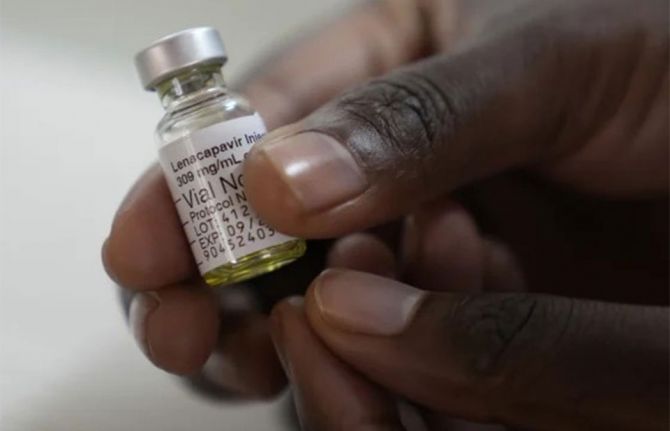
Press Statement
UNAIDS response to Gilead’s announcement on signing voluntary licensing agreements on lenacapavir with six generic manufacturers
02 October 2024 02 October 2024GENEVA, 2 October 2024—Responding to today’s announcement by Gilead on lenacapavir, UNAIDS Executive Director Winnie Byanyima said:
“We welcome Gilead’s announcement of licensing the break-through HIV medicine lenacapavir for generic production. To stem the tide of new infections, and protect people most at risk from HIV, including young women and people from marginalised communities, long-acting HIV medicines are vital. Lenacapavir, which requires only two injections per year, could be game changing – if all who would benefit can access it.
We applaud Gilead for licensing the medicine without waiting for registration, which should be the norm. We are battling a pandemic and the speed at which generic versions come to market will dictate whether this medicine can really be transformative. At UNAIDS we commit to doing all we can to speed up this process.
Including an African producer in Egypt is also very welcome.
Much more work is still urgently needed to ensure that no one who needs lenacapavir is left behind and that Gilead’s commitment to rapid, affordable access is fulfilled.
The exclusion of many middle-income countries from the licenses is deeply worrying and undermines the potential of this scientific breakthrough.
HIV prevention products need to be deployed where new HIV infections are highest – and right now, forty-one percent of new infections are in upper-middle income countries. UNAIDS urges Gilead to secure further licenses for access in all low and middle-income nations.
We welcome Gilead’s statement of commitment to non-profit pricing, but we had been waiting eagerly for a specific price. We urge Gilead to disclose it, and to provide full transparency on their costs. Respected researchers have shown it is possible to produce and sell lenacapavir for $100 per patient per year, falling to as little as $40.
Manufacturing this medicine in African countries with the highest HIV rates is crucial for sustainability and Gilead should include manufacturers in countries like South Africa where there is strong production capacity. We at UNAIDS stand ready to assist.
UNAIDS urges Gilead to secure further licenses for access in all low and middle-income nations.
We urge Gilead also to do all it can to make lenacapavir viable for treatment in low- and middle-income countries, including working together with researchers to test new combinations. Over 30 million people worldwide taking HIV treatment every day deserve long-acting options. We recognize that Gilead has included treatment use in the license, where some companies have not, but we urge that they remove the current limitation in the license to “heavily treatment-experienced patients.” To support scientists and manufacturers worldwide, licenses should not be limited to specific uses.
Leaving no one behind is how to unlock lenacapavir’s full potential, fulfil Gilead’s promise, protect a generation from HIV and bring forward the end of the AIDS pandemic."
Note: Gilead’s announcement can be read on their site at https://www.gilead.com/news/news-details/2024/gilead-signs-royalty-free-voluntary-licensing-agreements-with-six-generic-manufacturers-to-increase-access-to-lenacapavir-for-hiv-prevention-in-high-incidence-resource-limited-countries
UNAIDS
The Joint United Nations Programme on HIV/AIDS (UNAIDS) leads and inspires the world to achieve its shared vision of zero new HIV infections, zero discrimination and zero AIDS-related deaths. UNAIDS unites the efforts of 11 UN organizations—UNHCR, UNICEF, WFP, UNDP, UNFPA, UNODC, UN Women, ILO, UNESCO, WHO and the World Bank—and works closely with global and national partners towards ending the AIDS epidemic by 2030 as part of the Sustainable Development Goals. Learn more at unaids.org and connect with us on Facebook, Twitter, Instagram and YouTube.
Documents
2024 global AIDS report — The Urgency of Now: AIDS at a Crossroads
22 July 2024
This UNAIDS 2024 report brings together new data and case studies which demonstrate that the decisions and policy choices taken by world leaders this year will decide the fate of millions of lives and whether the world’s deadliest pandemic is overcome. Related links: Press release | Special web site | Executive summary | Fact sheet | Video playlist | Epidemiology slides | Data on HIV | Annex 2: Methods Regional profiles: Asia and the Pacific | Caribbean | Eastern Europe and Central Asia | Eastern and Southern Africa| Latin America | Middle East and North Africa | Western and Central Africa | Western and Central Europe and North America Thematic briefing notes: People living with HIV | Gay men and other men who have sex with men | Transgender people | Sex workers | People who inject drugs | People in prisons and other closed settings | Adolescent girls and young women | Other translations: German

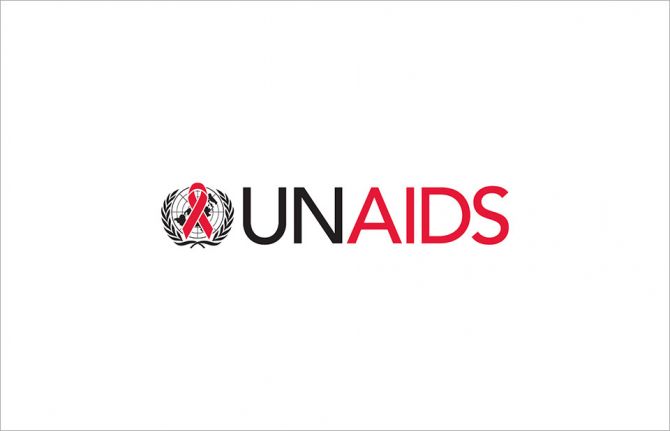
Press Release
New HIV drug can only offer hope of ending AIDS if all have access, UNAIDS says
10 July 2024 10 July 2024GENEVA, 10 July 2024— UNAIDS has welcomed the release of Gilead Sciences’ trial results on the injectable long-acting HIV medicine Lenacapavir for HIV prevention. The result “provides hope of accelerating efforts to end AIDS”, UNAIDS says, “but only if Gilead ensures that all people who need it can have access to this game-changing medicine.”
The recent trial of the medicine among cis-gender women in Uganda and South Africa was so successful that it was halted early. Twice-yearly injections of Lenacapavir showed overwhelming efficacy for preventing HIV infections compared to standard oral preventative HIV medicines, known as pre-exposure prophylaxis (PrEP). Additional trials are ongoing in Argentina, Brazil, Mexico, Peru, South Africa, Thailand and the United States.
UNAIDS has welcomed the “exciting development,” and urged the company to allow generic production of Lenacapavir to all low- and middle-income countries by negotiating voluntary licensing agreements through the Medicines Patent Pool (MPP). The MPP is a UN-backed programme with extensive experience negotiating generics agreements between originators and generic pharmaceutical companies.
Gilead has not yet announced its plans for low and middle-income countries. However, UNAIDS is concerned that Gilead’s latest statement regarding its access strategy for low and middle-income countries mentions only “high incidence countries and resource limited countries” and makes no specific mention of upper-middle-income countries or the Medicines Patent Pool. Upper middle-income countries account for 41% of new HIV infections and 37% of all people living with HIV. These countries are home to millions who cannot afford the prices Gilead charges high-income countries.
“The success of Gilead’s recent Lenacapavir trial is an exciting development. While we still await regulatory approvals, normative guidance and results from the other ongoing trials, this news offers hope that we can enable everyone who would benefit, including especially the most marginalised communities, to have access to the help they need. Enabling equitable global access to new technologies can help get the world on track to end AIDS as a public health threat by 2030,” said Winnie Byanyima, Executive Director of UNAIDS. "However, it is concerning that Gilead’s latest announcement seems to mention neither upper-middle income countries, where people cannot afford anything like Lenacapavir’s current $42,250 price tag, nor a commitment to work with the UN-backed Medicines Patent Pool. Without these safeguards, it cannot be assured that this game-changing medicine will reach all those who need it."
Notes
Data in this press release comes from UNAIDS 2023 Epidemiological estimates (aidsinfo.unaids.org)
The UNAIDS Executive Director joined more than 300 experts and activists calling for a generic version of Lenacapavir to be licensed to all low and middle-income countries through the MPP, in a letter coordinated by the People’s Medicines Alliance: https://peoplesmedicines.org/wp-content/uploads/2024/05/Gilead-Open-Letter_May-2024.pdf
The AIDS Vaccine Advocacy Coalition provides an overview of the Lenacapavir for PrEP trials: https://avac.org/resource/infographic/an-overview-of-lenacapavir-for-prep-trials/
UNAIDS
The Joint United Nations Programme on HIV/AIDS (UNAIDS) leads and inspires the world to achieve its shared vision of zero new HIV infections, zero discrimination and zero AIDS-related deaths. UNAIDS unites the efforts of 11 UN organizations—UNHCR, UNICEF, WFP, UNDP, UNFPA, UNODC, UN Women, ILO, UNESCO, WHO and the World Bank—and works closely with global and national partners towards ending the AIDS epidemic by 2030 as part of the Sustainable Development Goals. Learn more at unaids.org and connect with us on Facebook, Twitter, Instagram and YouTube.

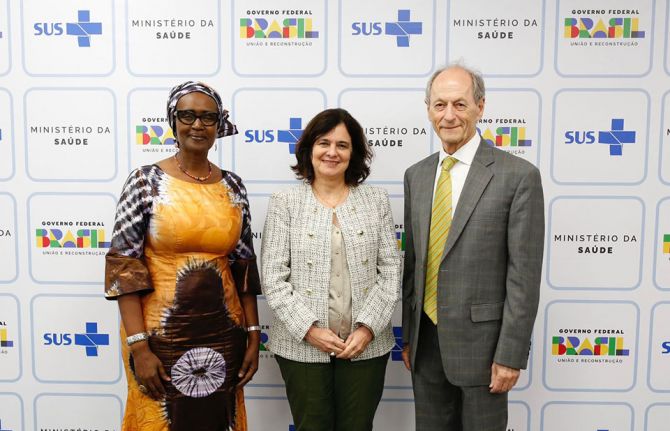
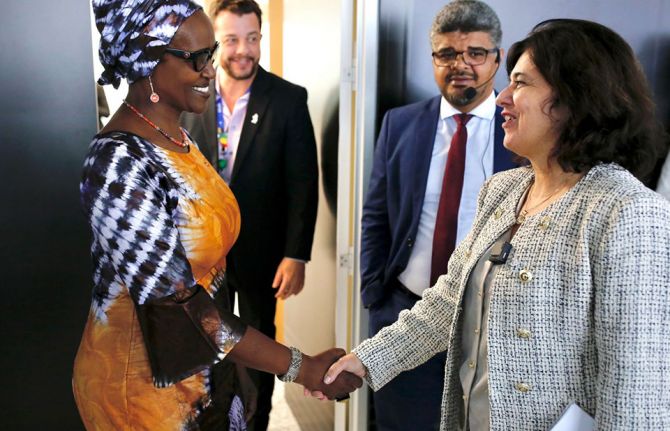
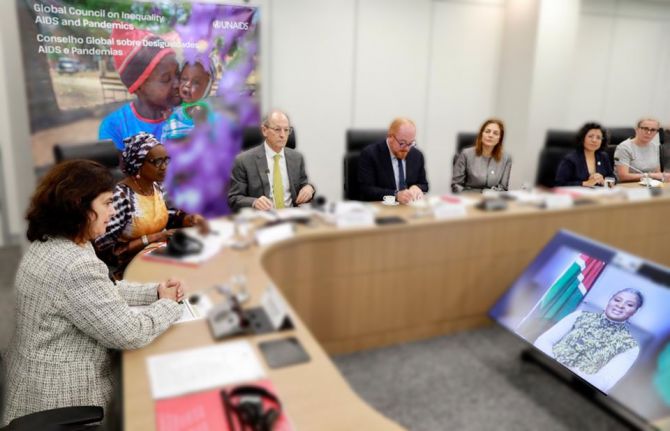
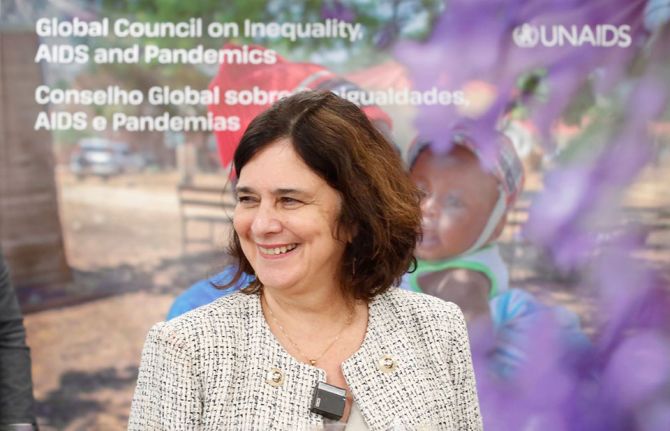
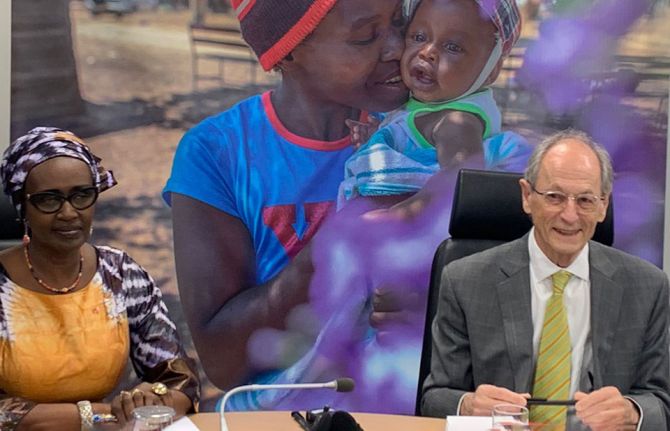
Press Release
Brazil hosts the announcement of the Global Council on Inequality, AIDS and Pandemics
06 June 2023 06 June 2023UNAIDS launching group to generate evidence on the inequalities driving pandemics and advocate for the adoption of multisectoral approaches to strengthen the response to AIDS and other pandemics
BRASILIA/GENEVA, 6 June 2023—Brazil is hosting the announcement of the new Global Council on Inequality, AIDS and Pandemics chaired by The First Lady of Namibia, Monica Geingos, the Director of the University College London Institute for Health Equity, Sir Michael Marmot and the Nobel prize winning economist, Joseph E. Stiglitz. Brazil’s Minister of Health, Nísia Trindade, is a founding member.
“I am delighted to host the announcement of the Global Council on Inequality, AIDS and Pandemics. It is time to convert lessons learned into action by reducing the inequalities driving today’s health crises and strengthening pandemic preparedness for the future,” said Ms Trindade, “Brazil is determined to play its part by making the case for increased collaboration and evidence-based policymaking to build more resilient health systems around the world.”
Social and economic inequalities within countries and between them are exacerbating and prolonging pandemics and amplifying their impact amongst the poorest and the most vulnerable. The same intersecting inequalities that drive HIV, COVID-19, MPox and other diseases are leaving countries and communities at risk of future outbreaks and pandemics. But experience shows that there are actions at the global, regional and national levels that can build pandemic responses that reduce rather than exacerbate inequality.
The work of the Global Council will harness essential evidence for policymakers and elevate political attention to the need for action to end inequalities that fuel AIDS and other pandemics. Crucially, it will encourage and support frontline communities to advocate for the policy shifts necessary to fight current pandemics and better prepare for tomorrow’s outbreaks.
“The AIDS response is one of the best examples of how communities experiencing intersecting inequalities can unite to overcome them and save millions of lives,” said UNAIDS Executive Director, Winnie Byanyima who is a member of the Global Council and is in Brazil for the announcement. “A broad movement of people living with and affected by HIV has brought down the price of medicines and diagnostics, strengthened national health responses, enabled the rise of a strong network of community-led organizations and secured the removal of punitive discriminatory laws in many countries. But evidence-based policies and approaches need to be applied everywhere and for everyone and sadly that’s not the case right now.”
Gender-based inequities endanger the health of women around the world. For example, in countries including Ghana, Côte d’Ivoire, and Liberia HIV prevalence for young women is more than 5 times more than young men of the same age—reflecting, in part, economic and education inequality.
“Gender inequality provides fuel to pandemics like AIDS and COVID-19” said the First Lady of Namibia, Monica Geingos. “It increases the vulnerability of women and girls to deadly viruses by limiting access to knowledge, financial resources, and life-choices and undermines their ability to protect themselves and their families. We have to re-imagine pandemic responses that can reduce inequality rather than exacerbate it.”
“Inequalities in access to health and other essential services are largely the result of deliberate policy choices,” said Joseph Stiglitz. “To fight future pandemics, we must learn the lessons of the HIV response and adopt inequality-busting approaches to make the world a healthier, fairer and safer place for everyone.”
Successes and failures in the HIV response provide valuable lessons on how the world can deal with future pandemics. For example, gay men are more likely to be living with HIV. But laws and policies drive the size of the gap. In Malaysia where gay men are criminalized and arrested gay men are 72 times more likely to be infected than other adults; but in Thailand where same-sex relations are legal and community pandemic response is strong, gay men are only 12 times more likely. Viruses cross population groups. These contribute to why Thailand, with lower inequality, is approaching epidemic control while Malaysia is losing ground in the fight against AIDS.
Meanwhile, the issue of inequality extends beyond HIV to other pandemics. Countries with higher income inequality, for example, have experienced greater COVID-19 mortality. At the height of the COVID-19 pandemic, wealthy countries spent billions of dollars on responses but almost half of developing countries were forced to cut health spending, undermining the capacity to fight global pandemics. Several countries in Africa continue reporting significant numbers of MPox deaths during the pandemic, yet the vaccines being used in high-income countries are not available.
Even within countries that have made good progress against HIV, some communities have struggled to benefit from the staggering pace of medical advances. In Brazil, HIV infections are falling dramatically among the white population as access to treatment is widened and new prevention tools such as PrEP are rolled out but HIV infections among the black population are still on the rise.
“Evidence-based strategies to address the social determinants of health are crucial not only for improved health outcomes for the individual but also for building stronger economies and fairer societies,” said Sir Michael Marmot, from Brasilia. “Health is a good marker of how well a society is doing overall. Health equity tells us about societal inequalities.”
UNAIDS
The Joint United Nations Programme on HIV/AIDS (UNAIDS) leads and inspires the world to achieve its shared vision of zero new HIV infections, zero discrimination and zero AIDS-related deaths. UNAIDS unites the efforts of 11 UN organizations—UNHCR, UNICEF, WFP, UNDP, UNFPA, UNODC, UN Women, ILO, UNESCO, WHO and the World Bank—and works closely with global and national partners towards ending the AIDS epidemic by 2030 as part of the Sustainable Development Goals. Learn more at unaids.org and connect with us on Facebook, Twitter, Instagram and YouTube.
Contact
UNAIDS BrazilRenato De Paiva Guimaraes
tel. +55 61 99304 2654
depaivaguimaraesr@unaids.org
UNAIDS Latin America and the Caribbean
Daniel de Castro
tel. +507 6998 3175
decastrod@unaids.org
UNAIDS Geneva
Michael Hollingdale
tel. +41 79 500 2119
hollingdalem@unaids.org
Website
Watch
Watch: Jovem de Expressao matters to young people in Ceilandia, Brazil
Region/country

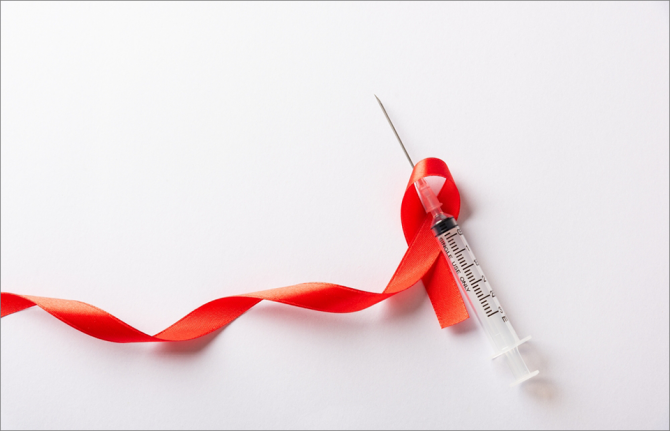
Press Release
UNAIDS welcomes the announcement by Medicines Patent Pool (MPP) and ViiV of three licenses signed with generic manufacturers for long-acting PrEP, and urges further urgent action by ViiV
31 March 2023 31 March 2023GENEVA, 31 March 2023 — UNAIDS welcomes the announcement by Medicines Patent Pool (MPP) and ViiV of three licenses signed with generic manufacturers Aurobindo, Cipla and Viatris for long-acting Cabotegravir for PrEP (Pre-exposure prophylaxis.) PrEP reduces risk of HIV transmission from sex or injecting drug use. UNAIDS also called for urgent action by ViiV to be taken to reduce the price and increase the production of CAB-LA now.
UNAIDS Deputy Executive Director for Policy, Advocacy and Knowledge, Christine Stegling said:
“UNAIDS applauds this announcement by the Medicines Patent Pool, and congratulates the companies on securing the licensing agreement. The generic production of affordable CAB-LA is essential to preventing millions of new HIV infections. The progress made is a testament to the power of campaigning communities who have mobilised to demand long-acting medicines, and to the determined efforts of access to medicines advocates. UNAIDS thanks ViiV for the commitment to tech sharing made through these agreements, and urges all patent holders of long-acting HIV medicines, including those still in development, to commit to share, and make their technology available, now. UNAIDS welcomes that this is only the first announcement of licensing, not the last, and urges ViiV to expand the geographic coverage of the licensing to all low and middle income countries. Because generic production will take several years to get to medicines being available for use, UNAIDS also urges ViiV to right now provide its own production of CAB-LA to procurers at an affordable price and in volumes that match need. We must all be driven by the fierce urgency of now.”
Progress in the global HIV response is slowing, and too many countries are seeing rising infections. The 2025 targets are in danger, and only bold actions can enable the curve of new infections to be pulled down. The deployment of new technologies such as long-acting CAB-LA at an affordable price is urgent and will help fill critical HIV prevention needs for people facing the highest HIV risks. It is also notably welcome that one of the sub-licenses (Cipla) plans to manufacture in South Africa, in addition to India. This is an important step in support of increased local manufacturing of medicines in Africa.
UNAIDS acknowledges this concrete step towards generic production of needed innovative products but urges that short term solutions be put in place immediately and until generic products are widely available. UNAIDS is notably concerned with the recent announcements that current supplies of CAB-LA are not at all sufficient to meet growing demand, and are much less than procurers have said they could purchase. Transparency in sharing information on volumes and price by ViiV of long-acting CAB-LA is essential to help drive progress in increasing volumes.
It is vital and urgent that long-acting anti-retrovirals for PrEP be made available at an affordable price everywhere they are needed. Middle-income countries are now where the majority of new HIV infections occur and home to many of the key populations most at risk of HIV transmission and who most need access to long-acting ARVs. But many countries are not included in this license despite considerable need for affordable new health technologies.
The issuance of these three licenses should pave the way for sharing technology on other innovations for long-acting HIV prevention and for long-acting treatment. UNAIDS urges that licensing help develop a path for accelerated market entry of generic formulations of long-acting anti-retrovirals not only for prevention, but also for treatment, when normative guidance is established, and regulatory approvals are in place at country level.
UNAIDS calls on the private sector, governments and funders to ensure that everyone who needs long-acting antiretrovirals can access them. UNAIDS will continue working with the Coalition to Accelerate Access to Long-Acting PrEP that is jointly convened by the Global Fund on AIDS, TB and Malaria, PEPFAR, Unitaid and the World Health Organization (WHO) with AVAC as its Secretariat to find solutions and ensure equitable global access to pandemic-fighting technologies for all.
UNAIDS
The Joint United Nations Programme on HIV/AIDS (UNAIDS) leads and inspires the world to achieve its shared vision of zero new HIV infections, zero discrimination and zero AIDS-related deaths. UNAIDS unites the efforts of 11 UN organizations—UNHCR, UNICEF, WFP, UNDP, UNFPA, UNODC, UN Women, ILO, UNESCO, WHO and the World Bank—and works closely with global and national partners towards ending the AIDS epidemic by 2030 as part of the Sustainable Development Goals. Learn more at unaids.org and connect with us on Facebook, Twitter, Instagram and YouTube.

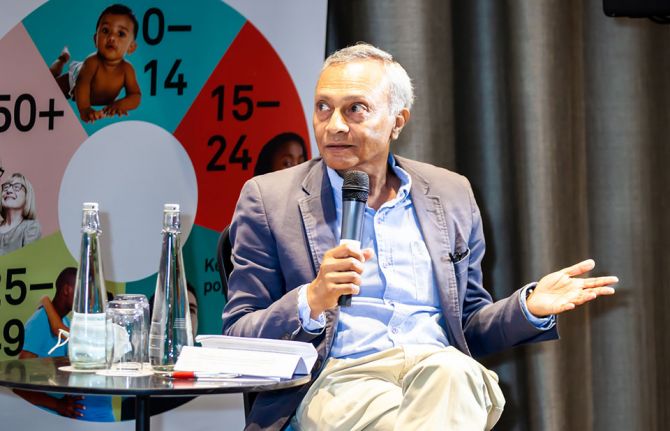
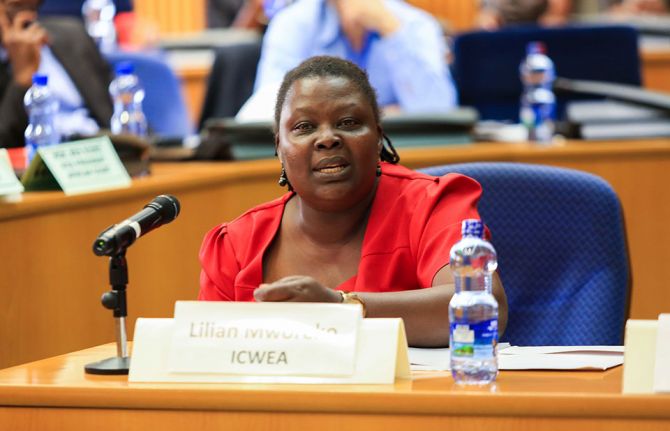
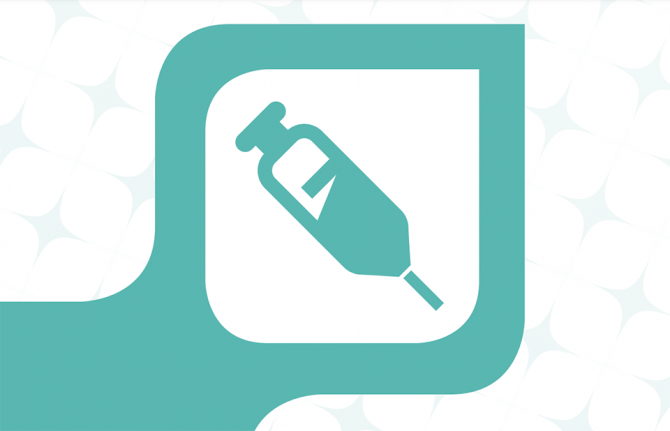
Feature Story
Delays in global, affordable access to long-acting, injectable HIV medicines would cost lives, say AIDS campaigners
16 November 2022
16 November 2022 16 November 2022GENEVA – Reflecting on 100 days since the 24th International AIDS Conference in Montreal, at which the World Health Organisation issued landmark guidance on how long-acting injectable anti-retroviral medicines can help prevent new HIV infections, and ViiV Healthcare committed to enabling access, AIDS campaigners are urging ViiV Healthcare to take vital next steps to enable timely rollout of game-changing, life-saving, long-acting injectable HIV medicine to millions of people.
At AIDS2022, the International AIDS Conference in Montreal, 29th July - 2nd August, ViiV Healthcare the manufacturer of cabotegravir (CAB-LA) committed to share technology, and ensure an affordable price, for the long-acting, injectable HIV medicine. The announcement generated international excitement as CAB-LA has been shown to be a safe and effective prevention tool. Reflecting on 100 days since then, global health leaders say there is an urgent need to for ViiV to take crucial next steps.
ViiV committed at the Conference in Montreal to lower the price for CAB-LA in a subset of low- and middle-income countries. But ViiV has not yet published this price. Advocates say the annual per person price needs to be equivalent to the price of oral PrEP, tens of dollars not hundreds of dollars. Multiple governments and financing agencies have indicated their interest in purchasing CAB-LA for PrEP if the medicine is offered at an affordable price point. Advocates are calling on ViiV to transparently and rapidly share details of their planned pricing strategy.
“ViiV Healthcare needs to publicly announce an interim pricing strategy, which prioritises affordability so countries and procurement bodies can plan and purchase at scale,” said Dr Yogan Pillay, South Africa country director at The Clinton Health Access Initiative. “Governments and other procurers will only purchase long-acting injectable HIV medicines at scale if the drugs are affordable and if there’s a clear timeline as to when the drugs will be available.”
While ViiV’s commitment to facilitate the generic production of CAB-LA via an agreement with the Medicines Patent Pool for use in 90 countries is helpful, HIV experts are calling on ViiV to allow an expansion of the number of countries eligible in order to accelerate progress in supplying the product to those in need. Although the current set of 90 countries includes both low- and middle-income countries, it excludes dozens of other middle-income countries, amongst which are countries with high rates of HIV infection. Expanding the list of countries would help incentivise generic production by expanding the potential market size.
“ViiV Healthcare should allow generic production and supply in all low- and middle-income countries,” said Lilian Mworeko, Executive Director, International Community of Women Living with HIV East Africa. “Anything short of this would mean that millions of people who need these products would not be able to access them for years to come. Every day of delay would represent failure to prevent the spread of HIV and takes us further away from ending AIDS by 2030.”
“At the AIDS Conference in Montreal, ViiV took important first steps to enable this powerful new prevention tool to reach many in need. It is now time for ViiV to take additional courageous steps. These include ensuring registration with medicines agencies in all the countries with the highest rates of HIV, announcing the low price and expanding the set of countries allowed in the generic market. Bold actions by ViiV in this moment could help save millions of lives,” said Matthew Kavanagh, Deputy Executive Director, a.i. at UNAIDS.

